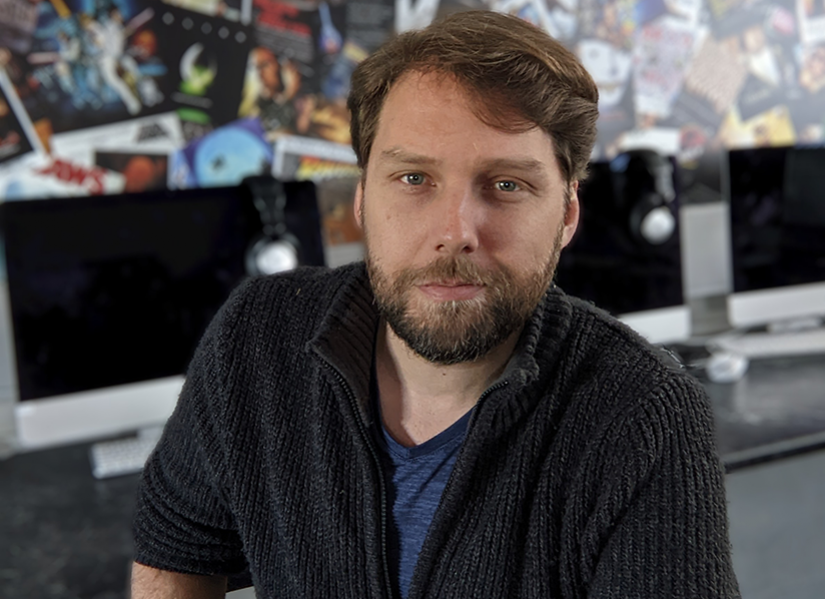
Zoe Engeman, 31 July, 2024
John McGeachin has every kid's dream job—for real life! Since graduating from QUT in 2004, he has made a name for himself as a talented Animation Screenwriter and Video Content Creator. John has worked on award-winning shows like #7dayslater, Doodles, and the beloved Bluey. In this Q&A, he shares his experience in the television industry, his episode-writing process, and how he got involved with everyone’s favourite blue heeler family.
Can you tell us about your journey into comedy screenwriting, particularly in children's animation?
My journey in screenwriting started at QUT as a teenager, where I found a community of like-minded artists, writers, composers and creatives, many of whom I still work with today. Years of sharing scripts and ideas and staying in each other’s orbits as we worked our way up in the industry eventually led to us collaborating first on comedy shows for the ABC and ultimately our own animated series The Strange Chores.
Co-writing an episode of Bluey would be a dream job for many. Can you share the story behind how you got involved with the show?
While working on Chores (out of a small office Ludo Studio had on the Kelvin Grove campus), I was aware of another show taking shape down the hall and I could see their work was head and shoulders above anything else out there. So when the opportunity presented itself to pitch some ideas to help fill out season 1, I was very fortunate that Joe Brumm liked one of them and decided to push ahead with it. Co-writing it with him was an incredibly lucky opportunity and I learned a lot from his approach to storytelling.
 Can you walk us through your typical writing process for an episode?
Can you walk us through your typical writing process for an episode?
The Strange Chores follows a trio of preteen monster hunters doing weird and wild supernatural chores for an ageing monster hunter. We quickly found the best way into writing wasn’t by brainstorming chores or monsters, but rather by focusing on unique experiences we went through as 12-year-olds: not getting a birthday invitation, being jealous of a friend’s success, trying to hide a mistake. A lesson I’ve taken away from this, which I apply to all future projects, is to always start with honest emotion and then build the comedy from there.
What were some highlights of working on Emmy-winning shows like #7dayslater and doodles?
#7dayslater was an experimental series that ran for six episodes with each one conceived, filmed and released in one week. A highlight for me there was pitching a political debate featuring zombies on Monday and then seeing it filmed on the Q&A set at ABC Sydney on Thursday. It was a weird week.
Where do you find inspiration for your stories and characters?
As I’m sure many film students can attest, we come to this industry largely as fans of pop culture, books, and TV. The best story rooms I have been in start with an informal conversation about our influences and what we have been watching lately. With the right combination of people, you can have some fascinating conversations that always get the rusty gears turning.
Do you ever experience writer’s block? What tools or techniques do you use to overcome it?
I find writer’s block tends to come only when I write in isolation. I’m very fortunate to work with a very talented writer/director named Luke Tierney who is an excellent soundboard and idea firehose. The best tool is finding someone whose brain seems to thrum at the same frequency as yours.
What advice would you give to aspiring comedy screenwriters who dream of working in children's animation?
Find a pdf of your favourite show's script online and read it, see how the formatting works and how they lay out the action beats. Then get access to a free scriptwriting program and transcribe a different episode of that show, beat by beat and line by line. Try to deconstruct what they did and why it works. When you have a handle on this, try to write your own original episode of that show in the same style. Then write your own original script and (here’s the hard part) show it to your friends.
You’ve voiced characters in shows like The Strange Chores alongside your screenwriting. What was it like to engage in this new aspect of storytelling?
Terrific, if only for the fact I got paid twice! Seriously though, it gave me a deeper appreciation for the nuance and skill that voice actors possess. As Harrison Ford told George Lucas “You can write this stuff, but you can’t read it”. It’s a good reminder that the script is a living document that is added to by hundreds of skilled professionals before the final product is reached.
You’ve mentioned that you teach filmmaking and scriptwriting to schoolchildren in your spare time. What do you enjoy most about this?
Working with High School students is so rewarding, whether it’s tutoring Year 8s on the basics of editing or working with Seniors to realise their big artistic visions. Nothing makes me happier than a kid building up the courage to say ‘I think I have a cool idea but I need advice on how to do it’. Encouraging passionate students to be vulnerable and make a grand statement is a wonderful feeling.
Lastly – a fun one! If you could swap lives with any character from a show you’ve worked on, who would it be and why?
I voice the Chores version of Dracula on our show which is hard to beat – dresses great, has a stately castle and hosts extravagant parties. If it wasn’t for the whole blood-drinking thing I’d swap in a heartbeat.
John McGeachin
QUT degree - Bachelor of Fine Arts (Film and Television) (2004) - now the Bachelor of Creative Arts (Film and Screen).
Have a question for John? Connect with him on LinkedIn.
